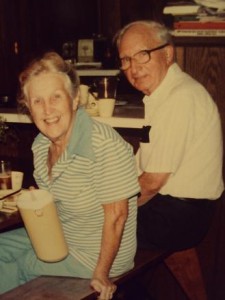By now you know that my mother, a joke-teller with the best of them, was also a joke-player, and April 1st was prime time for her to “fool around.”
Dad married Mom in 1941, and on their first April Fool’s Day together, he must have wondered what he’d gotten himself into. Being the dignified, quiet Swede he was, he would no more have played a joke on someone than have jumped off a tall building.
Mom fixed Dad’s breakfast as always that day (one hard boiled egg, two pieces of toast, orange juice and coffee). Since Dad always salted his egg and sugared his coffee, she decided to fool him by switching the salt and sugar. He stirred a big spoon of salt into his coffee and shook sugar on his peeled egg. When he took that first sip and spit it out, Mom laughed with gusto. “April Fool!” she said.
The next year she did it again, along with the 48 April 1sts after that. Dad never remembered and went through the breakfast misery every year. Whether or not he got a kick out of seeing Mom’s delight in fooling him, we’ll never know. In his wisdom, Dad may actually have anticipated the joke but then willingly “played the fool” for her pleasure. We’ll never know that, either.
Mom loved to laugh, and Dad’s salt-sugar-switch aside, she loved to see others laugh, too. I’d say she pulled some foolish tricks questing after giggles, but she was definitely not a fool, at least not by biblical standards.
Scripture has a great deal to say about genuine fools. (I repeat: Mom was not one of them.) Here’s a sample of true foolishness:
- A chattering fool comes to ruin.
- A fool’s heart blurts out folly.
- Honor is not fitting for a fool.
- Fools hate knowledge.
- The way of fools seems right to them.
- The mouths of fools are their undoing.
- Fools despise wisdom and instruction.
- Fools die for lack of sense.
A biblical study of the word “fool” causes me not to want to be one. So how can I be sure I’m not? The Bible gives two good clues:
- Even fools are thought wise if they keep silent.
- Those who trust in themselves are fools.
If I keep my mouth shut (or at least refrain from babbling), and if I trust in God rather than in myself, I have a head start toward avoiding genuine foolishness.
Mom was no fool, and I’m sure of that, because every biblical reference to fools includes their disdain for the Lord and his wisdom, which Mom loved. But she was good at fooling people. Even in her departure to heaven, she came close to pulling a good one. She died on April 5, 2005, but all of us know she was really shooting for April Fools Day.
”The message of the cross is foolishness to those who are perishing, but to [Mom and] us who are being saved, it is the power of God.” (1 Corinthians 1:18)



